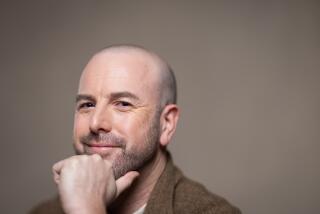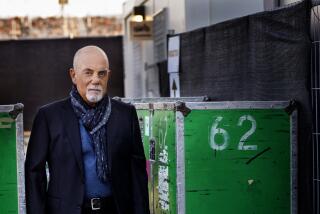Getz Makes Most of Life’s 2nd Chance
- Share via
Almost literally, life has begun anew for Stan Getz. He is a performer, talent scout (singer Diane Schuur is his proudest protegee), teacher (mainly at Stanford University, not far from his California home) and dedicated propagandist for jazz.
He remains one of the most influential virtuosi of the tenor saxophone, playing with the same tonal beauty and personal style that marked his original years in the big time (he joined Woody Herman’s orchestra in 1947); yet a year ago it seemed his career might be at an end. A malignant tumor was discovered behind his heart, and extensive surgery was required.
“It’s been 10 months since I had the operation,” Getz, 61, said the other day, “and everything worked out wonderfully; all I have to do is take an X-ray every couple of months.
“It’s strange, but I feel that if you put everything in God’s hands--leave the driving to him, so to speak--that’s the way to go. I’m exercising regularly, and I’m on a limited schedule, going out on the road far less than I used to.”
This week his plans call for him to appear tonight at the Hollywood Bowl opposite Grover Washington Jr., followed by two evenings at the Loa Club in Santa Monica. Sunday, he will be back at Stanford--playing an annual benefit for the university’s jazz department--with his quartet, Joe Pass, the Hi-Los and Viva Brasil.
“I’m teaching at Stanford whenever I’m in town and have the time, but mostly I help organize the funding and line up talent to come in and do four concerts a year,” Getz says.
His involvement with the academic world is closely tied to a campaign for greater understanding of jazz. Getz was pleased when Rep. John Conyers Jr. (D-Mich.) and Sen. Alan Cranston (D-Calif.) last year introduced a concurrent resolution declaring jazz a national treasure, but he feels that this in itself was not enough.
“Declarations in Congress are marvelous, because they do draw attention to the fact that this music is more than light entertainment. It has suffered an unusual fate--misunderstood in the land of its birth; too often its buoyancy and rhythmic thrust have been confused with pushiness and arrogance,” Getz says.
“The value of jazz still has to be clarified. People involve themselves with its superficialities without digging for its soul. Fortunately, a beginning has been made, through the rapid growth of jazz programs in our schools.
“I’ve been talking about this on the Larry King show and everywhere else I can. I’ll be dealing with it in my speech at the Jazz Times Convention.” (Getz will be this year’s guest of honor at the magazine’s convention Oct. 5 in Universal City.)
Much of the problem, Getz says, has to do with America’s obsession with what is current and the tendency to neglect some of our senior giants.
“Too many great men have been lost to early deaths--they were burned out by the continuous traveling, the drain of creating when there was so little regard for what they do,” Getz says. “Why did a marvelous saxophonist like Ben Webster have to waste his last years in Europe when his value as a teacher could have been put to such great use in some of our schools?
“It’s ironic how little we do to help our own. Did you know that in Denmark all the jazz clubs are subsidized? When I play over there in small towns where they may lose money, the government picks up the slack. No wonder so many of our best and brightest, in order to survive, have had to seek haven in Europe.”
Getz himself lived through a few years of expatriation before his identification with the bossa nova movement brought his American career to a new peak. (Asked whether he has wearied of requests for sambas, he replied casually: “I just don’t play them--well, never more than one or two a night.”)
This summer has found him at two opposite poles. He can be heard in a typically languorous Getzian solo on the title track in pop star Huey Lewis’ new album, “Small World” (Chrysalis OV 41622). But he is also stepping up his work with symphonies.
“William Thomas McKinley wrote a work that we previewed June 10 with the Stanford Symphony, and next summer I’ll probably be performing with John Williams at Tanglewood.”
Somewhere in the musical middle is his planned participation with Grover Washington Jr. “I love Grover’s playing. I’m sure we’ll wind up doing something together during the Bowl concert.”
More to Read
The biggest entertainment stories
Get our big stories about Hollywood, film, television, music, arts, culture and more right in your inbox as soon as they publish.
You may occasionally receive promotional content from the Los Angeles Times.










